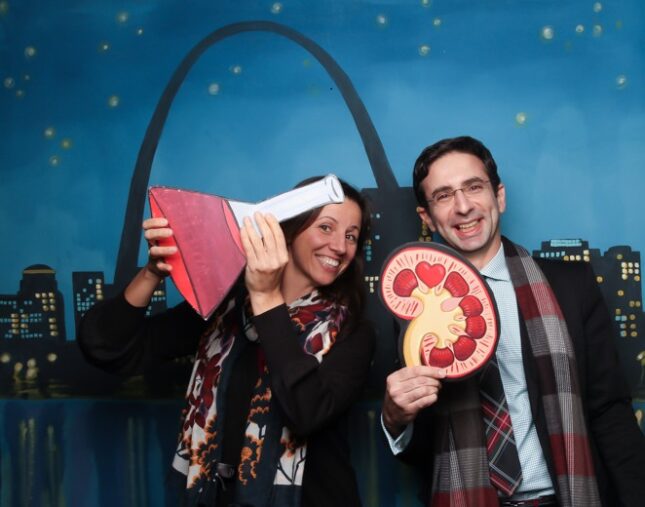The Division of Nephrology’s 2019 Translational Innovation Grant has been awarded to Instructor of Medicine Eirini Kefalogianni, PhD, and Assistant Professor of Medicine Charbel C. Khoury, MD, in the sum of $50,000.

Eirini Kefalogianni, PhD, and Charbel C. Khoury, MD, to collaborate on diabetic nephropathy project
The Translational Innovation Grant program, now in its fourth year, brings together a basic scientist and a clinician from within the division to collaborative on a project that has translational potential.
The winning proposal is titled Circulating immune cell types in diabetic nephropathy and their regulation by circulating TNFR1/2.
Circulating levels of Tumor-Necrosis-Factor-Receptors 1 and 2 (TNFR1/2) are important correlative markers in kidney disease. TNFR1/2 levels are very strong predictors of the progression to end-stage renal disease in type 2 diabetes patients and can predict stage 3 chronic kidney disease in type 1 diabetes. As well, TNFR1/2 levels are associated with early glomerular lesions and predict heart failure risk in type 2 diabetes, and are associated with disease severity in other causes of chronic kidney disease.
“Seven years after the initial identification of circulating TNFR1/2 as predictors of diabetic nephropathy progression, their roles still remain unknown,” says Dr. Kefalogianni. “This grant is providing a unique opportunity to bring together our expertise in clinical and basic research to address this problem.”
The project of Drs. Kefalogianni and Khoury will investigate whether circulating TNFR1/2 levels are also causally related to and have immunomodulary effects on disease activity or progression.
Their research will be the first to characterize the forms and functions of circulating TNFR1/2 in diabetic nephropathy and test their effects on circulating immune cells with regard to surface receptor and cytokine expression profiles. Patients will be recruited via the Kidney Translational Research Center core facility.
Findings from the study could establish the first mechanistic link between circulating forms of TNFR1/2 and inflammation in kidney disease patients and spur the development of drugs that target TNFR1/2 pathways for the prevention or treatment of diabetic nephropathy or other chronic kidney diseases.
“We expect this study to set the foundation for a broad line of translational investigation, to stimulate mechanistic basic research in the field of kidney and inflammatory diseases and, possibly, identify components of the TNFR1/2 pathways as targets for diabetic nephropathy and other chronic kidney diseases,” says Kefalogianni.
Follow the links to see recipients of the Translational Innovation Grants for 2015, 2016 and 2017.